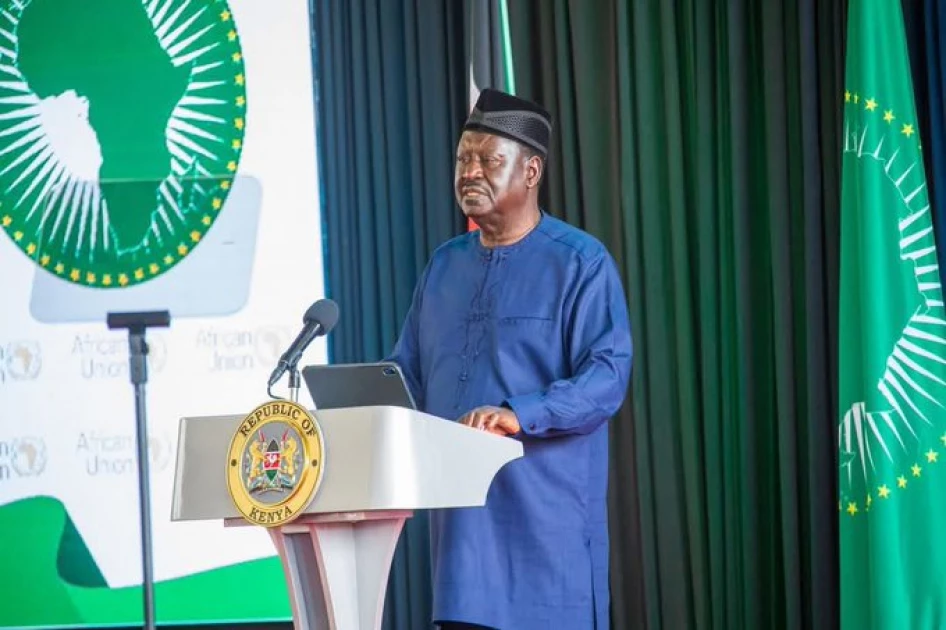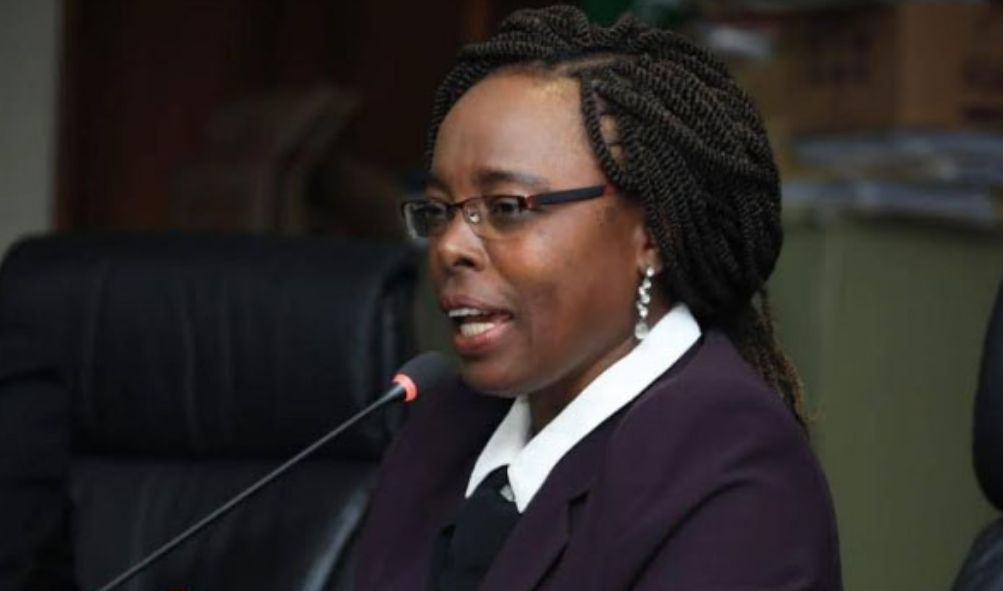Investigations
How Raila’s AUC Bid Drained Ksh 523 Million from Public Funds

The Kenyan government quietly allocated over Ksh 523 million of taxpayers’ money to support Raila Odinga’s failed bid for the African Union Commission chairmanship.
This massive expenditure, previously hidden in official records, has now come to light following a new report by the Controller of Budget (CoB), Margaret Nyakang’o.
The funds, sourced from the national treasury, were funneled to the State Department for Foreign Affairs to bankroll Raila’s campaign across the continent.
Despite this heavy financial investment, the ODM leader lost the election to Djibouti’s Mahmoud Ali Youssouf. The revelation raises tough questions about government spending priorities, transparency, and accountability.

Controller of Budget Margaret Nyakang’o during a press briefing in Nairobi, where she revealed the Ksh 523 million Treasury allocation for Raila’s AUC bid in her latest report. [Photo: Courtesy]
Raila’s AUC Bid Backed by Treasury with Ksh 523 Million
The Controller of Budget’s latest review of government spending paints a disturbing picture of unchecked political spending. In her National Government Budget Implementation Review Report for FY 2024/2025, CoB Nyakang’o disclosed that the National Treasury, led by CS John Mbadi, approved a staggering Ksh 523.8 million in November 2024 to boost Raila’s campaign for the AUC chairmanship.
However, the CoB only released Ksh 216.2 million in February 2025 after reviewing a formal requisition by the State Department for Foreign Affairs. This means more than half the approved amount was held back — but not before a chunk was already disbursed to finance trips, publicity, and other logistics.
This move reveals a complex dance between political ambition and financial authority. While the Treasury approves allocations, only the CoB has the constitutional power to allow actual withdrawals from the Consolidated Fund.
In this case, the Treasury greenlit the funds, and the Foreign Affairs department requested a portion, which the CoB partially approved. The campaign was elaborate. Raila enjoyed full backing from President William Ruto, and over 100 Members of Parliament traveled to Addis Ababa in January 2025 to push his candidacy.
All this occurred under the cover of “diplomatic relations,” but the new report makes it clear that the primary mission was to secure Raila’s position at the African Union.
Political Power Play Ends in Defeat
Despite the aggressive campaign and heavy state funding, Raila lost. Djibouti’s Mahmoud Ali Youssouf was declared the winner, crushing Kenya’s high-stakes gamble. The loss wasn’t just political — it exposed deep cracks in how public funds are managed and justified.
Following the election, angry murmurs filled Parliament and the public square. Juja MP George Koimburi publicly accused the government of spending Ksh 13 billion on Raila’s campaign, far above what the CoB report confirms. The figure might have been an exaggeration, but it sparked a national conversation on hidden campaign costs and the misuse of public money.
Raila, in response, dismissed the Ksh 13 billion claim. He argued that the government only provided transportation and basic support for his travels. “I don’t know which world these guys live in and whether they know what a billion means,” he said.
But the facts remain — the government diverted over half a billion shillings to fund a personal political mission that yielded no results. This failure adds to the growing mistrust between citizens and the state, especially at a time when essential services face budget cuts and inflation continues to squeeze families.
A Question of Priorities and Accountability
The Raila AUC bid has exposed troubling flaws in Kenya’s budget oversight systems. While Nyakang’o did her job by partially approving the requisition, the fact that such a significant allocation was even approved raises questions about transparency and government priorities.
In a struggling economy, why is the government funding political campaigns abroad instead of focusing on healthcare, education, or food security? Why did this campaign need over Ksh 500 million, especially when the country routinely pleads poverty in other key sectors?
The CoB report provides the first official confirmation of the real costs behind the campaign. It also puts pressure on the Ruto administration to explain why public funds were used so freely for a political ally’s international ambitions.
More importantly, the report forces Kenya to confront a deeper question — who holds leaders accountable when national resources are used for personal gain? Kenya’s Constitution created checks and balances for a reason, yet the silence from oversight bodies and Parliament before the release of this report shows how easily those systems can be bypassed.
The Raila AUC bid may be over, but the fallout is far from done. With mounting public anger, opposition scrutiny, and media attention, the government must come clean. Transparency is not a favor to the people — it is a duty. If leaders can funnel half a billion shillings toward a failed political dream, what else are they hiding?
Kenya Insights allows guest blogging, if you want to be published on Kenya’s most authoritative and accurate blog, have an expose, news TIPS, story angles, human interest stories, drop us an email on [email protected] or via Telegram
-

 Grapevine1 week ago
Grapevine1 week agoAlleged Male Lover Claims His Life Is in Danger, Leaks Screenshots and Private Videos Linking SportPesa CEO Ronald Karauri
-

 Lifestyle2 weeks ago
Lifestyle2 weeks agoThe General’s Fall: From Barracks To Bankruptcy As Illness Ravages Karangi’s Memory And Empire
-

 Grapevine5 days ago
Grapevine5 days agoRussian Man’s Secret Sex Recordings Ignite Fury as Questions Mount Over Consent and Easy Pick-Ups in Nairobi
-

 Investigations2 weeks ago
Investigations2 weeks agoEpstein Files: Sultan bin Sulayem Bragged on His Closeness to President Uhuru Then His Firm DP World Controversially Won Port Construction in Kenya, Tanzania
-

 Investigations2 days ago
Investigations2 days agoMulti-Million Dollar Fraud: Three Kenyans Face US Extradition in Massive Cybercrime Conspiracy
-

 Investigations2 weeks ago
Investigations2 weeks agoEpstein’s Girlfriend Ghislaine Maxwell Frequently Visited Kenya As Files Reveal Local Secret Links With The Underage Sex Trafficking Ring
-

 News2 weeks ago
News2 weeks agoState Agency Exposes Five Top Names Linked To Poor Building Approvals In Nairobi, Recommends Dismissal After City Hall Probe
-

 Business1 week ago
Business1 week agoM-Gas Pursues Carbon Credit Billions as Koko Networks Wreckage Exposes Market’s Dark Underbelly















